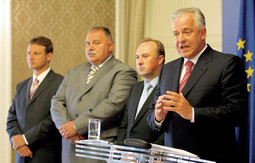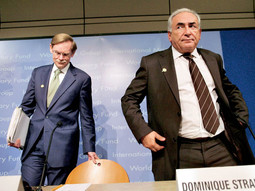Published in Nacional number 678, 2008-11-10
Exclusive
Country to go belly up without IMF help
Over the coming three weeks, the Croatian government will seriously consider the option of seeking financial aid from the IMF to pay off the maturing foreign debt
 Ivo Sanader, Damir Polancec and Ivan Suker Croatian Government is seriously considering the possibility of seeking financial aid from international financial institutions, above all from the International Monetary Fund (IMF), over the coming three weeks in order to avoid a financial collapse in the coming year. This information was confirmed for Nacional by several sources from international financial circles, who are well in the know when it comes to the work of the finance ministry and the Croatian National Bank (CNB). They say that Government and the CNB will turn to the IMF for assistance at the latest by the time the 2009 state budget is adopted, undergoing hurried, and almost secretive, preparations these days at the finance ministry. The budget should be in Parliament for debate on 15 November, and Government will have an IMF guarantee by then. How the budget will look is known for the moment only by those who are working on it. But, based on what economy minister Damir Polancec told a conference entitled "Who Will Survive, And Who Will Fail" Monday, the nation's key financial document could be a very restrictive one. Polancec's ministry has, namely, earmarked 147 million kuna less for next year than it did for this year.
Ivo Sanader, Damir Polancec and Ivan Suker Croatian Government is seriously considering the possibility of seeking financial aid from international financial institutions, above all from the International Monetary Fund (IMF), over the coming three weeks in order to avoid a financial collapse in the coming year. This information was confirmed for Nacional by several sources from international financial circles, who are well in the know when it comes to the work of the finance ministry and the Croatian National Bank (CNB). They say that Government and the CNB will turn to the IMF for assistance at the latest by the time the 2009 state budget is adopted, undergoing hurried, and almost secretive, preparations these days at the finance ministry. The budget should be in Parliament for debate on 15 November, and Government will have an IMF guarantee by then. How the budget will look is known for the moment only by those who are working on it. But, based on what economy minister Damir Polancec told a conference entitled "Who Will Survive, And Who Will Fail" Monday, the nation's key financial document could be a very restrictive one. Polancec's ministry has, namely, earmarked 147 million kuna less for next year than it did for this year.
It is quite clear now that the global financial crisis has poured over into Croatia and that our country is the next victim of the banking collapse that started recently in the United States of America, which has resulted in a global paralysis in the flow of international capital, and will, unavoidably, wind up in a recession and economic crisis on all Western countries. The chief reason for turning to the IMF for help, with which Croatia has worked for years on the basis of stand-by arrangements, is in fact the inability to get credit to service the foreign debt, which will soon come due. In the coming year the state and the economy will have to return 10.8 billion euros of various loans, received in previous years from abroad. Of that the state itself owes international financial institutions 5 billion euros. Experts feel that, with the forecast economic growth of only 2 percent in the coming year, Government and the private sector will be hard pressed just to pay the interest. It has happened in the past that a large sum of the principal has come due for payment by the state, but in previous years that problem was dealt with simply by reprogramming the debt, because it was relatively easy to come by capital on international markets. The situation has changed over the past two months and it is impossible to get new loans at the old prices.
Those in the known say that the accumulated debt and the cost of the administration has the national treasury splitting at its seams, and that finance minister Ivan Suker is currently experiencing the worst quarter to date in his two mandates at the post. At issue is not only the payment of debts to creditors, but also regular monthly payments to beneficiaries of the national budget. Every month, Minister Suker has to put aside 1.1 billion kuna for pensions, and a further 1.8 billion kuna for salaries financed from the national budget. There has even been information that the national budget is being patched up by simply taking part of the annual budget funds earmarked for various Government agencies, key to their functioning and the payment of wages.
 Robert Zoellick and Dominique Strauss-Kahn The toughest issue the finance ministry is now facing is how the state will pay off a billion euro of foreign debt in the circumstances of a financial crisis, coming up for payment over the coming three to four months. By the end of the year Croatia has to pay off bonds worth 200 million euro in total. By February of next year another 500 million euro of bonds come due, and after that the state will have to pay off 200 million euro of the co-called Samurai bonds. One of the solutions mentioned in financial circles is the possibility of issuing new bonds in the first half of next year, on the domestic market, in combination with direct bank loans, but it is an open question as to whether domestic banks have the strength to follow the state's lead in circumstances of rampant illiquidity. Allegedly the CNB will be forced to reduce mandatory bank reserves to make it easier for the banks to directly finance the state. These plans are, however, significantly hampered by the financial crisis that has increased the cost of financing and hiked the yields investors are demanding. One of the first to warn of Croatia's significant exposure to the international financial crisis were the analysts at Deutsche Bank. In October, they ranked Croatia first among 19 countries who faced the danger of a withdrawal of interbank credit lines over the coming year. For comparison, Hungary, which has already sought and received 25 billion euros of assistance from the IMF and the World Bank, was fifth in Deutsche Bank's ranking of threat faced by countries. It should be pointed out that the share of the Hungarian foreign debt in the gross domestic product, just as has Croatia's, long ago passed the 90 percent point.
Robert Zoellick and Dominique Strauss-Kahn The toughest issue the finance ministry is now facing is how the state will pay off a billion euro of foreign debt in the circumstances of a financial crisis, coming up for payment over the coming three to four months. By the end of the year Croatia has to pay off bonds worth 200 million euro in total. By February of next year another 500 million euro of bonds come due, and after that the state will have to pay off 200 million euro of the co-called Samurai bonds. One of the solutions mentioned in financial circles is the possibility of issuing new bonds in the first half of next year, on the domestic market, in combination with direct bank loans, but it is an open question as to whether domestic banks have the strength to follow the state's lead in circumstances of rampant illiquidity. Allegedly the CNB will be forced to reduce mandatory bank reserves to make it easier for the banks to directly finance the state. These plans are, however, significantly hampered by the financial crisis that has increased the cost of financing and hiked the yields investors are demanding. One of the first to warn of Croatia's significant exposure to the international financial crisis were the analysts at Deutsche Bank. In October, they ranked Croatia first among 19 countries who faced the danger of a withdrawal of interbank credit lines over the coming year. For comparison, Hungary, which has already sought and received 25 billion euros of assistance from the IMF and the World Bank, was fifth in Deutsche Bank's ranking of threat faced by countries. It should be pointed out that the share of the Hungarian foreign debt in the gross domestic product, just as has Croatia's, long ago passed the 90 percent point.In light of the bail out of Hungary, it will be interesting with what the IMF will make conditional a possible arrangement with Croatia. The Hungarian government has undertaken the obligation to create large financial reserves in the national budget, in order to be able to react to a recession. The Hungarians intend to get the money by making significant cuts to social expenditure. They will also freeze the wages of all those holding government jobs, and there will be a significant reduction in the amount of money that the state pays into the pension system. Along with that, the Hungarian government has undertaken the obligation to stop all planned national investments. Many agree that in Croatia to there is an inevitable review pending of all planned, even already launched, capital infrastructure projects. That this is the case is attested to by the fact that Croatian Motorways (HAC) were unable, recently, to secure an international line of credit to the tune of 200 million euro to continue the construction of the motorway to Dubrovnik. Of no avail to HAC was a proffered Croatian Government guarantee. Statements from Prime Minister Ivo Sanader, who was resolute recently in asking the IGH (Croatian Civil Engineering Institute) to slash the cost of a future passenger terminal at Zagreb's Pleso Airport, also need to be seen in this light. Sanader's administration, which has awarded the IGH contracts worth billions of kuna during its term, is now asking the company, led by Mr. Radic, to cut the price by 280 million euro, after the project has already been selected at a public tender. Sanader's reaction came only ten days after the tender for bids was completed, even if it was known from the start that the IGH's selected project for a terminal had already breached the set price limit by 50 million euro.
It is an open question what is to become of two other mega-projects, whose implementation has been entrusted to the IGH – the construction of the Peljesac Bridge and the Zagreb-Rijeka rail line. Those in the know when it comes to national finances feel that, in the new circumstances, Government is feeling the pinch even when it comes to the organisation of the World Handball Championships, which are to be held in the second half of January in seven Croatian cities. Government has assumed the financing of a part of the organisation costs, and is financing the construction of a 200-million-kuna stadium in Osijek directly from the budget. A large portion of the organisation costs are borne by the cities, who could also find themselves in financial problems, as they will in coming years have to secure payments for the maintenance of the handball arenas. The obligation to pay damages arising from litigation to the Hypo bank and the Italian construction company Astaldi has also come at an unfortunate juncture, and Government must pay them a total of 78 million euro. Government will not be able to avid making the payments for long if it does not want to find itself in contempt of international obligations. IN the current situation Sanader's team cannot allow itself any kind of nonchalant behaviour, especially now that international rating agencies have begun to warn of the ever worsening prospects of Croatia's credit rating.
The coming recession and economic crisis are a further, not a separate problem. As a result of falling consumer spending, the national budget is already now reaping fewer tax kuna than is did last year. It is an open question what will happen next year when companies will have to pay off almost six billion euro of foreign debt and when, according to forecasts, there will be practically no economic growth. Many companies will find themselves in trouble and it is an open question how many will survive the recession, which will reduce the state's income and increase its social spending.
0 percent economic growth CNB governor Zeljko Rohatinski recently forecasted that the Croatian economy would grow by 2 percent next year. On Monday, 10 November, economy minister Damir Polancec said that, after deep consideration, he had come to the conclusion that economic growth of 3.8 to 4.5 percent was possible. But foreign analysts are, however, ever more frequently warning that Croatia could be happy if its economy does not wind up in negative territory in the coming year.
European recipe in the war on recession
 Mervyn King According to unofficial information Bank of England governor Mervyn King will soon cut the reference interest rate in Great Britain. Analysts estimate that the British central bank could, in the end, slash the reference interest rate to zero. If that was to happen, it will be the greatest reduction of interest rates in Great Britain since World War II. The Bank of England's reference interest rate, namely, currently stands at 4.5 percent, and is one of the highest in the European Union. In this way the Bank of England is trying to curb the worsening recession in the British economy. The reduction of the reference interest rate should, namely, result in cheaper and more available credit, and this increased flow of capital could help the British private sector ride out the crisis easier.
Mervyn King According to unofficial information Bank of England governor Mervyn King will soon cut the reference interest rate in Great Britain. Analysts estimate that the British central bank could, in the end, slash the reference interest rate to zero. If that was to happen, it will be the greatest reduction of interest rates in Great Britain since World War II. The Bank of England's reference interest rate, namely, currently stands at 4.5 percent, and is one of the highest in the European Union. In this way the Bank of England is trying to curb the worsening recession in the British economy. The reduction of the reference interest rate should, namely, result in cheaper and more available credit, and this increased flow of capital could help the British private sector ride out the crisis easier.
These kinds of measures from the British central bank are nothing new. Most of the world's large central banks have for some time now been gradually reducing reference interest rate, but no one has yet moved to make such a radical cut. The FED, the US central bank has undertaken the most similar reference interest rate reduction action, which now stand at 1 percent in the USA. The European Central Bank has also significantly reduced its interest rate, so that it now stands at 3.25 percent. These moves on the part of the world's large central banks will result in a drop in the interest rates banks calculate on interbank lending, so that a drop in commercial credit interest rates is to be expected.
Despite the fact that the Croatian National Bank does not function on the principle of reference interest rates, these trends will have an effect on the Croatian banking system. As a result of them, namely, Croatian banks will be able to access cheaper loans abroad, and it is to be expected that they will offer cheaper loans in Croatia. Banks will continue to maintain very restrictive criteria when issuing loans, but it is almost certain that loans for lower-risk investments, such as real estate, will be cheaper in Croatia. That is excellent news for Croatian construction companies, who have over the past ten months been faced with a sharp drop in demand. Since the start of the year the sale of real estate has dropped by 25 percent in Zagreb alone. Cheaper and more readily available credit could trigger a partial stabilisation of the Croatian real estate market.
Related articles
Sanader’s eight fear SDP — Won’t bring down Government
Despite forecasts that he would, former Croatian Prime Minister Ivo Sanader, who recently took his seat in Parliament, will not work from the house… Više
Latest news
-
28.10.2010. / 14:15
'A profitable INA is in everyone's interest'
-
28.10.2010. / 09:38
Sanader’s eight fear SDP — Won’t bring down Government
-
21.10.2010. / 15:02
Interior Ministry turned a blind eye on Pukanic assassination
-
20.10.2010. / 09:34
Barisic could bankrupt HDZ




